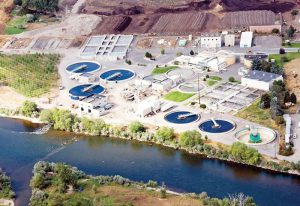BioCycle March/April 2017
Missoula, Montana: Garden City Compost
This spring, Missoula residents will have the opportunity to top off their gardens with municipally produced Garden City Compost. Since 1977, compost has been available from EKO Compost, a privately owned company that operated in Montana, Idaho and Hawaii. Five years ago, the city purchased the land EKO Compost operated on, knowing it wanted to keep composting there even if EKO decided to sell. In November 2016, the City of Missoula finalized its purchase of the company itself. “When Tom Pawlish, EKO Compost’s owner, indicated he wanted to sell its Missoula location, the City saw an opportunity it couldn’t pass up,” explains Starr Sullivan, the Wastewater Superintendent who will now manage the new facility. Sullivan isn’t new to composting though. The wastewater treatment plant he manages provided EKO Compost with biosolids for years prior to the purchase of the company. Biosolids were conveyed over a fence from the treatment plant to EKO.
When Pawlish was ready to sell, the City Council approved a bond allowing the $1.2 million purchase, which included all equipment and product on hand at the time of purchase. Last year, EKO Compost produced approximately 25,000 cubic yards of compost. The city will pay for the purchase with tipping fees and compost sales. The facility will continue composting biosolids, commercial yard trimmings and some preconsumer food waste from three nearby Walmart stores. It hopes to expand its list of feedstocks to include residential food waste, and work with the University of Montana to increase organics diversion on campus.
In addition, to expanding composting services, the City of Missoula is planning some operational changes to help with odors and ensure the product is consistent. It has purchased two additional Twin City 40 HP 917 RBA aerators for static piles, a Morbark 1200XL WCL grinder for feedstocks and would like to purchase a RotoMix 3410 mixer soon. It also plans to reduce pile sizes to help improve aeration. “Missoula is committed to beneficial reuse,” adds Sullivan. “We are going to continue to move forward to expand these initiatives. We are fortunate to have a great deal of support from City Council.”
Frederick, Maryland: Household Food Scraps Collection Service
Key City Compost began collecting household food scraps in February using a subscription service model. Food waste collected is being processed in a backyard worm bin system and at Fox Haven Farm, a local organic grower. No meat or dairy products are accepted. Phil Wescott started Key City Compost in 2016, and was quickly joined by two friends, Julien Libert and Connor Self. “After many years of composting in my backyard, I decided to take the Neighborhood Soil Rebuilders course offered by the Institute for Local Self-Reliance,” explains Wescott. “The course exposed me to new methods of composting — and many mentors who encouraged me to pursue my passion.” Households can select weekly or biweekly collection; a clean bucket is left when the filled bucket is collected.
As the business grows, Key City Compost will be expanded to other small organic farms in the area. “Frederick County is in great need of two things,” notes Wescott. “First is some form of composting service to our community. Second is a local source of high quality finished soil products for our local growers. Local is the key word in both of these objectives. We want Frederick’s products and services to be made by and for its own land and citizens.” Maryland environmental regulations require that farms composting materials produced off-site must do the composting on less than 5,000 square feet, and there are additional height restrictions.
Denver, Colorado: Residential Organics Collection Expansion
The City of Denver’s residential organics collection program will be doubling the number of homes eligible for service in 2017. This expansion will happen in two phases, with the addition of homes in both the first and fourth quarters of 2017. The first phase will add two routes in March, and the second phase will add four routes in late fall. Approximately 80,000 homes in Denver are currently eligible to participate. Households can place yard trimmings, soiled paper, approved compostable tableware products and all food waste except grease or cooking oil into the carts. Collection is done by the city.
Organics are collected weekly, and taken to a commercial composting facility in Keenesburg, Colorado that is run by A1 Organics. The residential program, which is voluntary to participate, is a fee-based service charged at a rate of $29.25/quarter.











